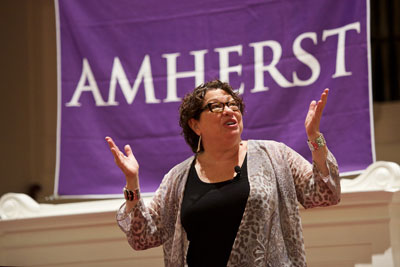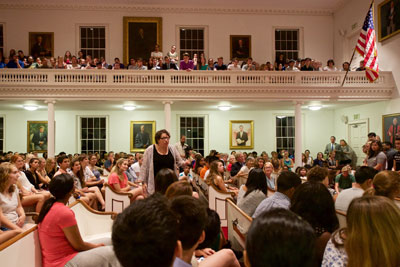September 9, 2015

Supreme Court Justice Sotomayor spoke on campus on Sept. 8
From the moment she arrived in Johnson Chapel, Sonia Sotomayor avoided the podium. Instead, the U.S. Supreme Court justice wandered the aisles. She perched on a pew. She posed for photos. “I want to take a picture with every student who’s brave enough to get up and ask a question,” she said. During the hour-long Q&A, she did exactly that.
Speaking to a full house at Amherst College on Sept. 8, Sotomayor devoted all but her first few minutes to answering questions from students, who quickly formed a line that stretched along the front of the room. She delivered advice on citizenship: “If you haven’t registered to vote, you have failed.” And on ignorance: “I’m never ashamed to ask what I don’t know.” And on college course loads: “Religion controls most of the politics in the world. Learn about a religion other than your own.”
Sotomayor is the first Hispanic and the third woman to serve on the nation’s highest judicial body. When her name was first floated for the position of associate justice, she said, she took out a yellow pad and made a list of pros and cons. The cons list was longer. But she recalled the words of fellow judge Constance Baker Motley: “When you have a chance to open the door for others, you don’t have a right to say no.”
Throughout Sotomayor’s 2009 confirmation process, she remembered, some complained publicly that she wasn’t smart enough for the job. “At first that really got me down,” she said. “Then my stubbornness kicked in. And so I fought back.” The measure of one’s character, she told the audience, is “the number of times you get up and try again.”

Sotomayor answered questions from students from the floor
of Johnson Chapel throughout her entire talk
One student asked the justice to comment on “being a woman in a man’s world.” Sotomayor told a story from her Yale Law School days, when she was the only student to earn honors in a particular course. A classmate suggested it was because of her gender. Sotomayor replied, “No, it’s because I’m the only one who read the textbook.” When you focus too much on being the only woman in the room, she said, “you don’t get the job done.”
Sotomayor became a judge because she believes in the law, she said. She characterized her fellow justices as equally passionate. “I love the process of law. I love the Constitution. And I love our system of government.” Asked if she feels pressure to represent women and minorities on the bench, she said she bases her decisions not on her identity but on the law and precedent.
Sotomayor also spoke about her 2013 memoir, My Beloved World. President Biddy Martin announced that the College would give away copies to students the next day.
Early in her talk—after the thunderous standing ovation that marked her arrival—Sotomayor noted that people frequently ask about her legacy. She told the crowd: If I say something tonight that inspires you, that you remember, that influences you for the better, “that’s my legacy, and I will live as long as you live.”
A recording of the talk is available for those with an Amherst user name and password.